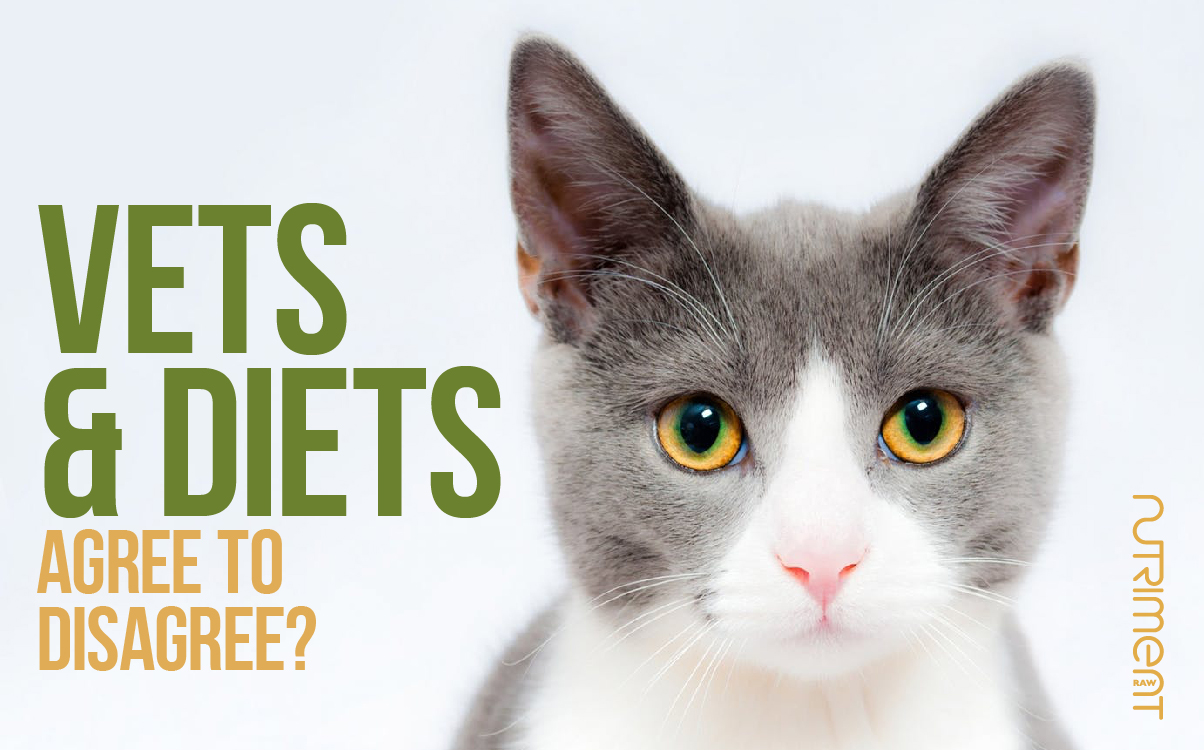Vets & Diets – Agree to Disagree?

Only around 4% of the dog and cat population are currently fed fresh and raw diets. This is still a tiny number, whilst it’s slowly growing, this also means that when visiting the vet most raw feeders do come across misinformed veterinary professionals, be it vets or vet nurses.
There are still plenty of fear-mongering myths that surround fresh and raw diets, from the mythical link between aggression and the taste of blood (remember how dogs evolved – if this was the case the evolution of domestication of our dogs would have stopped very early on) to you will kill your pet with bacteria (dogs are extremely well equipped to handle bacteria due to their acidic digestion). These are extremes but still often heard.

Why is this…?
- Many veterinary universities still give limited education on diets and this tends to focus on companion animals; a whole range of animals, not solely cats and dogs.
- Veterinary surgeries do see the sharp end when things go wrong, where people feed unbalanced diets, huge unsuitable bones, diets of just one protein etc.
With a combination of these reasons, many vets will not be keen when you mention “raw” diet, some positively anti. It’s important to remember that it’s only since the 1950s that highly processed diets for pets become mainstream, for millennia dogs and cats were fed on table scraps, leftover meats and anything scavenged – species appropriate diets by its definition is not a fad.
What you can do…?
If you come across negativity opposition from your vet, you have a few options really, but bare in mind you are a customer, you deserve respect. You might disagree with each other, however, as in any business, professional respect is essential. It is possible to have a good relationship whilst not seeing eye to eye on a diet. Your vet might be extremely good on diagnosis and you trust him implicitly, like with your GP. He/she is a general practitioner, not a specialist in nutrition. (If you are seeking specific nutritional advice do get in touch as we have qualified nutritionists who can help you and your pet.)
If you ever feel you cannot visit the vet because you raw feed or you do not dare to say you feed a species appropriate diet this should be a warning bell. In the relationship with your vet, for good clinical diagnosis, there needs to be honestly – if you don’t feel you can be it’s time to reassess.
- Nod and listen, if it’s not important for the reason you are visiting, then why get into a debate about it…
- Explain what you do exactly and why it works for you and your pet, the differences and improvements you have seen.
- Go home and find another veterinary surgery – if it’s important to you and feel uncomfortable, you have the choice, you can go elsewhere- it’s not the NHS. Veterinary surgeries are commercial enterprises – vote with your wallet.
The rise of supportive vets
More and more vets are literally going against the grain, so the options are there. Like you, some vets DO realise the importance of diet in terms of health. In 2015 the UK saw the birth of the
Raw Feeding Veterinary Society, a global organisation with a strong UK base which wishes to educate from within; vets, vet nurses and vet techs, and campaign for better health for our pets through diet.
To this day more and more vets are becoming more open to the idea of fresh and raw diets. If you are looking for a Raw Food Vet near you rawfoodvets.com has quite extensive listings.




